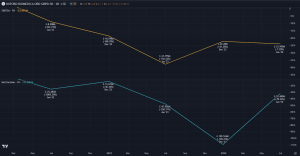Share this page:
HMRC has released data on personal and stakeholder pensions that reveals £31.3 billion was contributed to personal pensions in 2019/2020. This is a £3.4 billion increase when compared to the £27.9 billion contributed in 2018/2019.
The good news is that many of us are saving for retirement – with most of the credit given to the pension auto-enrolment scheme. The bad news is that many pension savers are getting caught out by annual allowances, incurring significant tax charges. Here’s what you need to know.
What is the current pension annual and lifetime allowance?
The government limits how much money you can save in your pension pot in a tax year. Exceeding the limit means you’ll have to pay tax. For the current tax year, the allowance is £40,000, but keep in mind that this could change in the future.
There’s also a limit to how much you can save in your lifetime. The allowance is currently £1,073,100, but this could also change in the future.
HMRC has revealed that the total value of contributions exceeding the annual allowance in 2019/2020 was £950 million. This was a £130 million increase on 2018/2019.
As a result, the total value of charges reported for exceeding the lifetime allowance in 2019/2020 was £342 million. This was a 21% increase from the £283 million reported in 2018/2019.
Why are pension savers getting caught out by annual allowances?
The most likely reason is failure to understand the pension allowance system, mainly because many people find it complicated.
The basic annual and lifetime allowance limits are pretty easy to understand. But things start to get tricky when the pension system includes triggers like money purchase annual allowance (MPAA) and tapered allowances.
Foe example, under the money purchase annual allowance, if savers access their pension pots and then continue to make contributions, their annual allowance drops from £40,000 to £4,000. Without this knowledge, they’ll most likely pay over the limit and incur significant tax charges.
They’ll also have a reduced (‘tapered’) annual allowance if both their ‘threshold income’ is over £200,000 and their ‘adjusted income’ is over £240,000. The gov.uk website offers a guide to working out your reduced (‘tapered’) annual allowance.
Additionally, if savings in your pension pots go above 100% of your earnings in a year, you could incur significant tax charges.
The long and short of it is that it’s easy to end up incurring additional charges if you’re not on the ball pension wise.
What can pension savers do to avoid getting caught out?
Having a better understanding of the pension allowance system might be your best chance to avoid exceeding the annual allowance. It’s a good idea to access the ‘tax on your private pension contributions’ resource on the gov.uk website. And if you find it tricky to understand, you can always seek the help of an independent financial adviser.
Keep in mind that if you go above the annual allowances, you’ll get a notice from your pension provider. You can use a pension allowance calculator to help you work out how much you’ve gone above the allowance. Then you can look into steps you can take to avoid repeating your mistake.
Saving in a pension is a responsible way to prepare for your retirement years – don’t let unexpected tax charges undo your good work.
Please note that tax treatment depends on your individual circumstances and may be subject to change in the future. The content in this article is provided for information purposes only. It is not intended to be, neither does it constitute, any form of tax advice. Readers are responsible for carrying out their own due diligence and for obtaining professional advice before making any investment decisions.
Could you be rewarded for your everyday spending?
Rewards credit cards include schemes that reward you simply for using your credit card. When you spend money on a rewards card you could earn loyalty points, in-store vouchers airmiles, and more. MyWalletHero makes it easy for you to find a card that matches your spending habits so you can get the most value from your rewards.
Was this article helpful?
YesNo
About the author
Victor is a freelance writer who loves to read and write about personal finance and related disciplines with the aim of educating people to make better financial and investment decisions.
Share this page:
Some offers on The Motley Fool UK site are from our partners — it’s how we make money and keep this site going. But does that impact our ratings? Nope. Our commitment is to you. If a product isn’t any good, our rating will reflect that, or we won’t list it at all. Also, while we aim to feature the best products available, we do not review every product on the market. Learn more here. The statements above are The Motley Fool’s alone and have not been provided or endorsed by bank advertisers. John Mackey, CEO of Whole Foods Market, an Amazon subsidiary, is a member of The Motley Fool’s board of directors. The Motley Fool UK has recommended Barclays, Hargreaves Lansdown, HSBC Holdings, Lloyds Banking Group, Mastercard, and Tesco.
This post was originally published on Motley Fool







